Atlantic Monthly Contributors's Blog, page 425
May 30, 2015
Destroying L.A. and Female Rock Critics: The Week in Pop-Culture Writing

On the Trail of a Creole Music Pioneer, Still Alive in Song
Campbell Robertson | The New York Times
“Years of attempts to recover the body of Amédé, as he is widely known, have come to nothing. As with Mozart’s grave, Amédé’s is known only by its general vicinity: the area where the blacks were buried.”
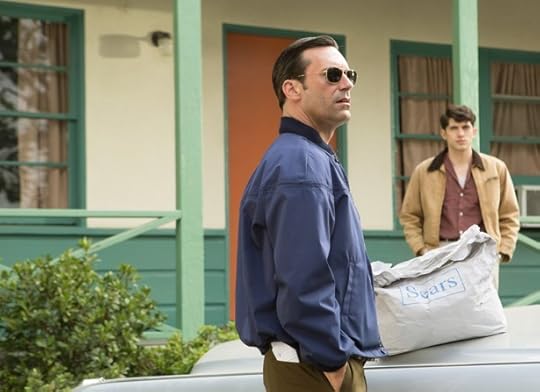
The World Needs Female Rock Critics
Anwen Crawford | The New Yorker
“When I was about fourteen, I stood outside science class holding a folder that was decorated with an array of faces which I had carefully cut out from the pages of music magazines. Pointing to a photo of Björk on my folder, a passing boy sneered at me, ‘I bet you don’t even know who she is.’”
L.A. Apocalypse! San Andreas and 23 Thoughts on Destroying the City of Angels
Alex Pappademas | Grantland
“When bad things happen to San Francisco onscreen—bat flu in Contagion, simian revolt in Rise of the Planet of the Apes and Dawn of the Planet of the Apes, a thick-necked thunder lizard fighting MUTOS downtown in Godzilla—we’re usually encouraged to see this as regrettable, whereas the versions of Los Angeles pulped in popular entertainment almost always seem on some level to deserve it.”
Cameron Crowe Takes Us on a Musical Tour Through His Filmography
Joanna Robinson | Vanity Fair
“Every passing soundtrack feels like a mix your untrendy friend or family member would make for you. Crowe’s not trying to impress, but he is giving fresh takes on enduring classics and handpicking new, rare gems for us to love and treasure as much as he does.”
Will Emma Sulkowicz’s Protest Mattress Wind Up in a Museum?
Andy Battaglia | Vulture
“The mattress itself is of course just part of the art, a prop to instigate all that happened around it. In that, it falls into another lineage as an artifact of performance art that can be difficult, if possible at all, to document and show.”
We All Agree that Mad Max: Fury Road Is Great. Here’s Why It’s Also Important.
Leah Schnelbach | Tor
“The people who referred to this film as a ‘Trojan Horse’ were completely correct—but Miller wasn’t smuggling feminist propaganda, he was disguising a story of healing as a fun summer blockbuster.”
What If The Wire Were Set in Ramallah?
Debra Kamin | Foreign Policy
“With a majority of Arabic dialogue, a cast packed with Arab actors, and a plot line that makes it clear that both sides are as complicated as they are culpable, Raz and Issacharoff have taken the black-and-white narrative of Israel and its enemies and spun it into all kinds of gray. In war, [Fauda] insists, you don’t know if you are right or wrong. You only know your orders.”









The Best Reason to Watch the Rock and Roll Hall of Fame Induction
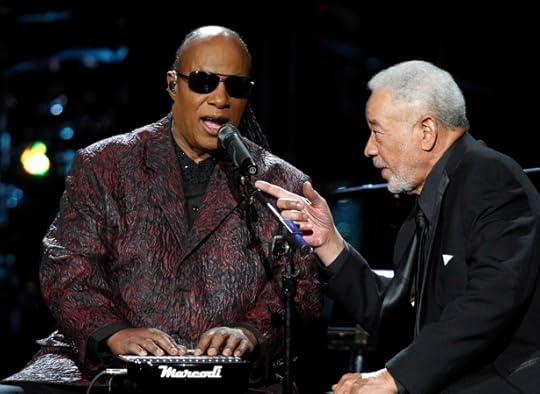
The first words sung on stage at the 2015 Rock and Roll Hall of Fame Induction Ceremony were “I don’t give a damn about my reputation,” a fact about which the jokes write themselves. Anyone showing up to be entered into a hall of fame gives a damn about his or her reputation, and that includes Joan Jett, regardless of the convincingly fierce way she delivered the lyrics she first recorded 34 years ago. After a speech from Miley Cyrus—opening line: “I'm gonna start off this induction with the first time I wanted to have sex with Joan Jett"—and remarks from the Blackhearts, Jett took to the mic with tears in her eyes. “I was really going to try not cry,” she said.
Related Story
Do Green Day Really Belong in the Hall of Fame?
Viewers of the ceremony, which airs Saturday night on HBO at 8, should be able to forgive the display of emotion. The Hall of Fame is both preposterous (an institution to rebellion) and unfair, as demonstrated by the fact that Ms. I Love Rock and Roll herself has been snubbed until now (a fact that Krist Novoselic complained about onstage last year, when Jett performed with Nirvana). But if there’s value in the ceremony, it’s in the reminder that rock and roll is some people’s life work, and that for however much fame and money successful musicians might make in their heyday, the notion of eternal recognition still has some value.
The poet Laurie Anderson offered the most gut-punching explanation of this idea while accepting a trophy on behalf of her late husband, Lou Reed. “They say you die three times,” she said. “First when your heart stops. Second is when you're buried or cremated. And third is the last time someone says your name.” Being in the hall means that Reed’s third death is a long ways off—though one suspects that’d be the case no matter what. The text of Anderson’s speech made the rounds online when the ceremony happened in April, but it’s worth watching for both her delivery and for when the entire auditorium says the departed’s name back at her: “Loooooou.”
The telecast features a number of other lovely moments, though the show’s perhaps best consumed with only partial attention; put it on the TV while making dinner, or something. On minute, you’ll be zoning out as an artist or a deceased artist’s kid reads a litany of thank-yous, and the next you’ll be agape at some huge performance: Jimmie Vaughan, Gary Clark Jr., and John Mayer blasting through an epic Stevie Ray Vaughan tribute, or a Rolling Stone listicle’s worth of musical icons joining Ringo Starr on stage for “With a Little Help From My Friends.” Starr’s also the subject of another highlight, a segment featuring the likes of Questlove and Max Weinberg at the Beatle’s drum set, explaining how to get that Ringo sound.
But if you’re going to watch one thing from this year’s induction, make it the Bill Withers segment, which deflates the pomp of the ceremony while embracing the ideals it seeks to represent. The 76-year-old Withers used his acceptance speech as a roast, lightly mocking Miley Cyrus, Beck, Stevie Wonder, and others in the room. He confessed to not being familiar with everyone’s music, as his rock career began in his 30s and he’s spent his later years watching a lot of Judge Judy. Then Withers sat on stage and watched as Wonder performed “Lovely Day” and John Legend sang “Use Me.” The two dueted for “Lean on Me,” and Withers finally, seeming begrudgingly, joined in. He hadn’t played a show in decades, and he was only going to let that fact change on his terms. It was the most rock-and-roll thing of the night—someone who may give a damn about his reputation, but wasn’t letting on.









May 29, 2015
The Disturbing Indictment Against Dennis Hastert
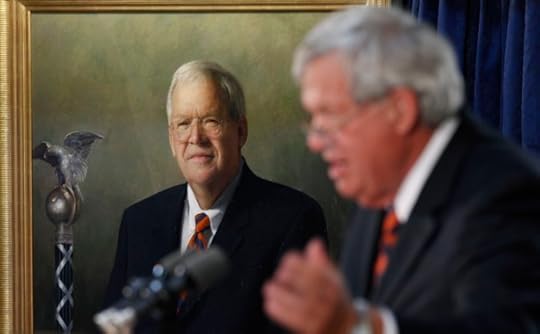
Updated on May 29, 2015, at 4:05 p.m.
Former House Speaker Dennis Hastert has been indicted on charges of lying to FBI agents and evading federal financial-reporting requirements, reportedly while paying a man to cover up past sexual misconduct.
Hastert, an Illinois Republican, was speaker from 1999 to 2007. BuzzFeed’s John Stanton notes that there were several high-profile congressional scandals in those years. Illinois is also a notorious hotbed for political corruption, as Roland Burris, Rod Blagojevich, George Ryan, and Jesse Jackson Jr. can attest.
But Hastert’s indictment seems to involve a darker story than political corruption. In or about 2010, according to the indictment, Hastert—a former high-school teacher and coach—met with an unnamed individual from Yorkville, Hastert’s hometown. They “discussed past misconduct by defendant against Individual A that had occurred years earlier.” In effect, Hastert fell victim to blackmail, the indictment alleges: He “agreed to provide Individual A $3.5 million in order to compensate for and conceal his prior misconduct against Individual A.” (Since leaving the House, Hastert has become a highly paid lobbyist.)
While Hastert has not made any comment and prosecutors haven’t offered any public explanations, the Los Angeles Times and NBC News reported that Friday that Hastert’s payments were made to cover up past sexual misconduct with a male. “It was sex,’’ a law-enforcement source told the Times, adding that it “occurred years earlier” than his election to public office, a timeframe that aligns with Hastert’s stint as a high school teacher and wrestling coach. BuzzFeed reported that a U.S. attorney withheld the details of the “prior misconduct” from the indictment at the request of Hastert’s lawyers, and that the prosecutor also considered additional charges against the former speaker tied to a second alleged victim, but decided against pursuing them.
After the 2010 meeting with Individual A, Hastert allegedly began withdrawing cash from his bank accounts to pay to the individual. But federal laws require financial institutions to report transactions greater than $10,000, and Hastert made a series of them. In April 2012, the indictment alleges, employees of Hastert’s bank questioned him about the withdrawals, and he promptly reduced his withdrawals to smaller amounts, to escape the requirement. Authorities were already watching, however, and they began investigating Hastert for structuring currency transactions to evade federal requirements—itself a crime.
When FBI agents questioned Hastert about it, he allegedly lied in his response:
Specifically, in response to the agents’ question confirming whether the purpose of the withdrawals was to store cash because he did not feel safe with the banking system, as he previously indicated, JOHN DENNIS HASTERT stated: “Yeah ... I kept the cash. That’s what I’m doing.” Whereas, in truth and in fact, as JOHN DENNIS HASTERT then well knew, this statement was false ...
The indictment does not reveal the identity of the individual with whom Hastert allegedly met. Nor does it identify the misconduct that Hastert was allegedly paying to cover up. It offers few hints, stating only that “Individual A has been a resident of Yorkville, Illinois and has known defendant JOHN DENNIS HASTERT most of Individual A’s life.”
The full indictment is here. There’s a great deal that’s still unclear about the case. Grand juries tend to follow prosecutors’ requests to indict, so it’s difficult to judge the merits of the case.
Hastert appears to be the first current or former speaker of the House to be indicted. Earlier this month, Democrat Jim Wright of Texas—who resigned amid scandal—died. Newt Gingrich was reprimanded for ethics violations while in office; his later resignation handed Hastert the speaker’s gavel. The suggestion of sexual misconduct on Hastert’s part has raised eyebrows in part because Hastert oversaw the investigation into Representative Mark Foley, a Florida Republican who resigned in 2006 after revelations that he sent sexually explicit messages and emails to congressional pages. Hastert was accused of dealing too leniently with Foley.









Another Term for Soccer's Most Powerful Man

Sepp Blatter, the embattled, divisive, seemingly invincible president of the International Federation of Association Football (FIFA), has been reelected for a fifth consecutive term, marking his 17th year as arguably the most powerful man in soccer. Blatter was confirmed after receiving 133 out of 209 votes in the first round—just shy of an outright majority, but enough to prompt his challenger, Jordan’s Prince Ali bin al-Hussein, to withdraw from the race.
At any other time, the intricacies of a leadership contest within FIFA, soccer’s governing body, might pass without much fanfare. But Blatter’s victory marks the end of a week in which seven senior FIFA officials were arrested in a Zurich hotel and nine charged by the U.S. Justice Department with racketeering, wire fraud, and money laundering. The question of whether the organization’s Swiss-born president could survive the indictment of so many of his colleagues might have seemed obvious to outsiders, but Blatter’s grip on global football is such that unseating him was always going to be extraordinarily difficult. Still, with increased scrutiny on FIFA’s actions, rising calls for a boycott of the 2018 World Cup, and the Justice Department’s acknowledgement that investigations are ongoing, Blatter’s role is more unstable than it’s ever been.
At the Friday meeting of FIFA’s 65th Congress, shortly before member nations cast their votes, Blatter addressed the assembled officials, praising FIFA’s mission of “unity, of bringing people together,” and going on an unexpected tangent about the principles of a fourth dimension. “Some might say that I’ve been with you for a long time, others might say for too long a time,” he said. “But what is this notion of time? Time is finite when we slice it up. I find that the time I’ve spent with FIFA is very short, and will remain short.”
Related Story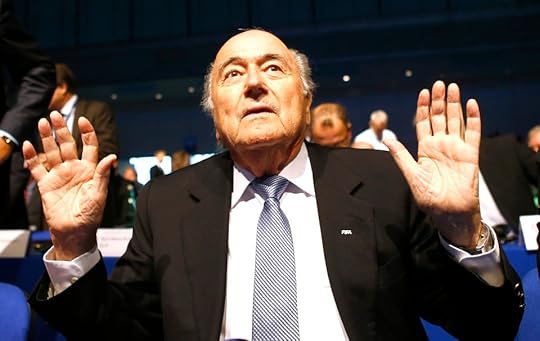
The Clock Finally Runs Out for FIFA
This kind of philosophical musing is characteristic of the 79-year-old, who’s spent the past few decades evading trouble and charming world leaders, even as he’s frustrated fans by refusing to allow goal-line technology and video replays in matches (he relented following a catastrophic disallowed goal in a match between England and Germany at the 2010 World Cup). He’s no stranger to gaffes, once stating that racism on the pitch could be solved with a simple handshake. But the announcement five years ago that the 2018 World Cup would be held in Russia and the 2022 World Cup in Qatar drew unprecedented reprobation and allegations of malfeasance.
Qatar, a tiny desert state in the Persian Gulf, beat out other countries including the United States, Japan, South Korea, and Australia despite having summer temperatures exceeding 120 degrees. It pledged to build air-conditioned stadiums to host the month-long event, but this was eventually deemed impractical, and the 2022 World Cup was rescheduled for winter, disrupting European leagues. The building of Qatar’s stadiums has also drawn criticism and allegations of slave labor, with 185 Nepalese migrant workers dying in 2013 while working on construction in the country.
The history of FIFA and its malcontents is a long and complex tale, and one in which corruption seems destined to play an intrinsic part. Blatter has worked for FIFA for more than 40 years, and has served as its president since 1998. Even then, his election was marred with charges of bribery (the vice president of the Confederation of African Football, Farra Ado, alleged that he’d been offered $100,000 to vote for Blatter), and his subsequent tenure has been similarly plagued with accusations of endemic corruption and misappropriation. But Blatter has also increased FIFA’s revenue substantially, from $600 million to over $2 billion in the past decade alone.
“Time is finite when we slice it up. I find that the time I’ve spent with FIFA is very short, and will remain short,” Blatter said.Blatter’s improbable victory this week is thanks to the way FIFA is structured. There are 209 member countries within the organization, and each gets one vote in the presidential election, meaning Brazil (population 200 million) has as much influence as San Marino (population 31,000). Earning the disdain of powerful countries like Germany and Britain might damage Blatter’s reputation globally, but it doesn’t do much to hurt his reelection chances, since he can effectively purchase the votes of smaller nations by bestowing largesse in the form of soccer pitches, new buildings, and other projects. FIFA’s website even has a “development globe” allowing people to see exactly where the organization’s cash has (in theory) been going, from women’s football programs in Afghanistan to infrastructure development in Togo.
Blatter’s support is unwavering in Asia and Africa, which have 100 member nations (and thus 100 votes) between them. “Blatter feels Africa, he sees Africa, and he has imparted so much—a lot of development programs,” Amaju Pinnick, the president of the Nigerian Football Association, told the BBC. “Without Blatter we wouldn’t enjoy all the benefits we enjoy today from FIFA. What Blatter pushes is equity, fairness, and equality among the nations. We don’t want to experiment.”
Following the announcement that Prince Ali of Jordan was conceding the presidential race, Blatter seemed triumphant, embracing colleagues. “For the next four years I will be in command of this boat called FIFA, and we will bring it back,” he said. “We will bring it back offshore, we will bring it back to the beach, where finally football will be played.” He said he’d spent the two-hour voting period meditating and praying to “God, Allah, whatever is this extraordinary spirit in the world,” but he also seemed eager to assert himself, assuring the crowd, “I am the president of the whole FIFA.”
Still, it’s unlikely that the challenges facing Blatter will end with his successful reelection. Greg Dyke, the chairman of the English Football Association, has expressed support for the concept of a coordinated European boycott of the 2018 World Cup in Russia, and Michel Platini, the president of the Union of European Football Associations (UEFA), has said that such a boycott is a possibility. On July 25, the qualifying rounds for the 2018 World Cup will be drawn in St. Petersburg, meaning that the debate over Blatter’s legitimacy is only just beginning.









'Let Me Fail Forward': David Oyelowo on His Next Big Challenge

Nightingale poses a challenge to its viewers from its opening scene on. Protagonist Peter Snowden (David Oyelowo) has done a terrible thing—only hints of the aftermath can be glimpsed on screen—and the audience is trapped in his house with him. The film, which premieres on HBO Friday, is an audacious one-man show—a series of deluded, sometimes charming, often tragic, occasionally frightening monologues delivered by a troubled veteran clearly in the midst of a dissociative crisis. Peter works in a menial job and lives with his mother at home, where Nightingale is entirely set, but, as he repeatedly states, his “circumstances have changed” in horrifying fashion.
Related Story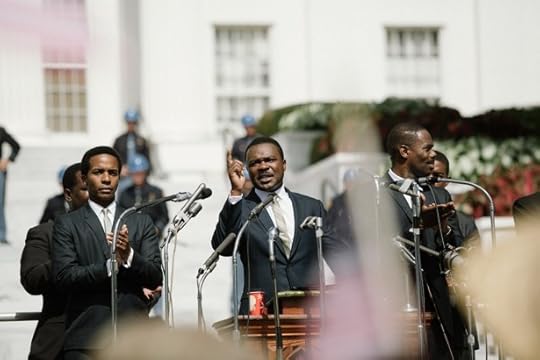
Selma: MLK in Masterful Microcosm
It's quickly apparent that Nightingale is going to be a claustrophobic experience, with Oyelowo the only person to appear on-screen for its feature-length running time. To the British actor, that made the script stand out all the more—it was written by a total unknown, Frederick Mensch, uploaded to the unproduced-script site The Black List, and quickly discovered there by the producer Josh Weinstock, who helped shepherd it to the screen. In an interview, Oyelowo said he was floored by the script's unusual format and the immediate revelation of what could have been its biggest plot twist.
“Frederick Mensch made the extraordinary choice of revealing what Peter has done from the first scene,” he said. “That's the point at which potentially the audience can go, ‘Okay, well I can't hang around this guy for an hour and a half.’ But within the writing, even as Peter is behaving badly and telling lies and in denial, there's a humanity that bleeds through, and an empathy.”
Nightingale's strongest achievement is finding that humanity in a character who could very easily come off as a psychotic caricature. The sources of Peter's demons are easy to chart: an overbearing mother, a traumatic experience in the military, and a decades-long struggle with his sexuality that plays out as an obsessive fixation on a fellow soldier. The central plot of Nightingale sees the newly liberated Peter trying to invite his friend over for dinner while batting away phone calls from his mother's concerned church friends and relatives and remodeling her home in a manic fashion. He talks on the phone, talks to himself, and most of all talks to an invisible audience that presumably exists online, speaking into a camera and “welcoming” comments that never come. Peter is at times flamboyant, and at other times stiff and fussy, but Oyelowo captures his humorous edges without ever crossing into more cartoonish territory.
“I wanted him to feel rooted in reality,” Oyelowo said. “There are people like Peter out there, having spoken to a psychiatrist. He’s not a psychopath, but he’s someone who suffers from dissociative identity disorder, whereby he has splintered himself into various variations born out of trauma in order to deal with his day.”
Nightingale’s main problem derives from the fact that its biggest strength—the unusual presentation—doesn’t allow a lot of room for plot development. Within 20 minutes, one can figure out everything that’s happening with Peter and the basics of his tortured past, leaving the rest of the film over to the slow build of tension. Will another character enter, or at least try to enter, the house at any point? Are Peter’s confessional monologues to camera being picked up by anyone in the outside world? Ambiguity largely prevails, so it's entirely on Oyelowo to hold the audience's interest after a certain point.
“I absolutely knew that I would be a better actor for having stepped into something that felt very exposing and terrifying.”“It was a challenge that I relished, really. Whether you’re a great ginormous movie star, or you're looking to do good work, when a script like this comes along, it tests your mettle,” Oyelowo said. “[Reading the script], you say, ‘Okay, if I'm going to fail, let me fail forward,’ and that’s how I felt. Even if it doesn’t work, I absolutely knew that I would be a better actor for having stepped into something that felt very exposing and terrifying. We put something unique out to the world, that is thought-provoking and challenging, so I decided to take the jump from that point of view.”
Oyelowo had been doing extraordinary work on stage and screen for years before his 2014 breakthrough playing Martin Luther King Jr. in Ava DuVernay's Selma, a performance that feels a world apart from Peter. To hear him tell it, that was a somewhat deliberate choice. “It’s such a blessing that Nightingale is coming out after Selma, which was a pretty unique experience in and of itself, but one that I don't necessarily want to be solely associated with,” he said. “I want to do lots of different things, and I think the more you make changes, the more the audience will hopefully be interested in what you're doing next.”









Game of Thrones: What's Going to Happen Next
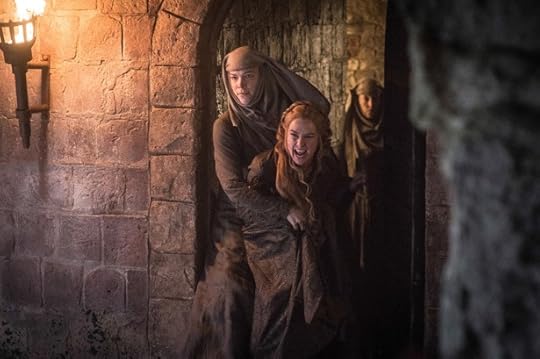
With only three episodes left to go, Game of Thrones looks as though it once again has a lot of ground to cover before wrapping up a season. And so, for the curious and impatient among you, I’ll do my best to offer some quasi-informed speculation about what we might reasonably expect in these final weeks.
Related Story
Game of Thrones: The Meeting Viewers Have Been Waiting for
Note: I haven’t seen any of the remaining episodes, but I have read the books. The first five items below are spoiler-y, but the predictions in them do not derive from the George R. R. Martin novels. Rather, they’re guesswork based on what’s already happened on the show and on tidbits scattered across the web: a behind-the-scenes photo here, a close-read of a trailer there. (They could all, of course, turn out to be completely wrong.) The last four items, however, are based at least in part on events that take place in A Feast for Crows and A Dance with Dragons, so non-book-readers may want to skip them. And obviously anyone, book-reader or not, who’d prefer to go into these final episodes without preconceptions—who doesn’t want to know at least some of what will (probably) happen—should stop reading now.
Finally, I don’t pretend to have kept up with every rumor or scrap of evidence in the ocean of Thronesiana currently sloshing around the web, and there are doubtless many clues I’ve missed in the show itself. So readers should feel free to offer their own predictions in the comments section.
1. Ramsay will get his (hopefully lethal) comeuppance. Of all the mistakes I feel showrunners Benioff and Weiss have made over the course of the show, half or more have involved Ramsay. They cut out the introduction accorded to him in the books, with the result that his relationship with Theon is less complex and diabolical and vastly more redundant and tedious. (I explained the alteration here.) And from the middle of season three, they’ve seemed incapable of resisting the urge to show us—again and again and again—what a depraved sadist he is. We get it! Ramsay is like a drug Benioff and Weiss just can’t quit. The obvious solution, heavily hinted at throughout this season (careful with that corkscrew, Sansa!), is for him to meet with some unfortunate fate.
That said, there’s been so much foreshadowing at this point that we’re in a bit of a lose-lose situation. If Ramsay is killed—whether with a knife or bottle-opener in the back or through some more complicated scheme (e.g., Sansa egging him into killing stepmom Walda)—it will hardly come as a shock. (Unlike, say, the demise suffered by the similarly insufferable Joffrey last season.) The real surprise will be if he lives to flay on into season six. And that is a possibility—a very live possibility—I find too depressing to contemplate.
2. Things will get hard in Hardhome. When the producers first revealed that this season would have a battle sequence more ambitious than those on the Blackwater in season two or at the Wall last year, I was hoping for Stannis versus the Boltons in the Battle of Winterfell. But it seems pretty clear now that the big fight will be at Hardhome, the Wildling fishing village toward which Jon Snow embarked last week. It also seems clear that the clash will be with White Walkers and their wights, possibly led by the “Night’s King” (or as my roundtable colleague Spencer Kornhaber memorably dubbed him, “Snow Willie Nelson”), whom we met last season. The best evidence I’ve seen for all this is here.
So the downside is probably no Battle of Winterfell, at least not this year. (More on this below.) The upside is that it’s useful to remind everyone at least once a season that Westeros faces a more pressing crisis—i.e., relentless, cerulean zombies—than those caused by any of the machinations of its noble houses. A lot will come down to execution here. The Walkers haven’t really been all that creepy since the very first scene of episode one. Here’s hoping that changes.
One element that seems almost certain to change is the timing of the battle. The fight for Hardhome seems set up to take place largely, if not entirely, in episode eight (hence the title: “Hardhome”) rather than episode nine, as in seasons two and four. So get ready for Sunday night.
Tyrion provides exactly the kind of guile Daenerys has been missing.3. This will be the beginning of a beautiful friendship between Tyrion and Daenerys. Will it really be? Who knows? But I think there’s every reason for optimism. The Imp provides exactly the kind of thread-the-needle guile Dany has been sorely missing, and hopefully he can begin to expedite her eventual return to Westeros and the story proper. As I noted last week, book readers have been waiting a long time for this rendezvous.
As for Ser Jorah, it looks as though Dany may sentence him to fight in the Great Pit of Draznak—basically the Rose Bowl of Meereen—in order to make amends for his past betrayal. (Yes, it’s ironic, given her whole position that only free men should be allowed to choose to fight, but they already pretty much dropped the ball on that idea last episode.) The best evidence I’ve seen for this theory—caution, there are some potential book-spoilers—is here.
4. Arya will get a chance to cross one more name off her list. As I noted early in the season, she’s down to just four now—“Cersei, Walder Frey, the Mountain, Meryn Trant”—and it just so happens that the last one on the list was conveniently dispatched to Braavos to accompany Mace Tyrell a while back. Also, the notes for episode nine include this: “Arya runs into someone from her past.” Will our teenage assassin get a bit of payback for Ser Meryn’s murder of Syrio Forel (and abuse of Sansa) way back when? Let’s just say that it couldn’t happen to a nicer Kingsguard.
5. Something will happen in Dorne. Honestly, I have no idea what it will be, and given how lame the entire Dorne subplot has been so far, I’m hard pressed to care. For my money, they should just cut to the Dornish cells once per episode for 30 seconds of Bronn singing. (Seriously, you need to hear his rendition of the Drifters’ “Up on the Roof,” which works even better as a lighthearted jailbreak anthem.) Maybe this storyline will eventually go somewhere interesting, but I’ll believe it when I see it.
The notes for episode nine include this: “Arya runs into someone from her past.” Will our teenage assassin get payback?And now for the book-based spoilers… Those who wish to preserve their remaining innocence should immediately find somewhere else to be.
6. Cersei will take a walk. Yes, that walk. There were initially difficulties getting permission to film the scene in Dubrovnik, Croatia, due to a ban on public nudity and the logistical challenges of bringing in 500 extras to heckle. But the issues were eventually ironed out. (There are more details on the shoot here.) It seems likely this scene will take place in the final episode of the season.
7. Jon Snow will have a bad day. Will Jon receive the same mistreatment at the hands of his fellow Crows that he did at the end of A Dance with Dragons? The show certainly seems to be suggesting as much with the way it keeps underlining the growing discontent with his leadership of the Night’s Watch. (The trailer for Sunday’s episode shows Sam once again trying to explain to Olly why they should make common cause with the folks who ate the boy’s ma and pa.) Moreover, the notes for episode nine say that Jon will return to the Wall from Hardhome, so there should be plenty of time for a little Ides of March action. Alternatively, it’s possible they’ll hold this twist for next season.
A related question is whether Jon will get the same letter from Ramsay (purportedly) that he received in the books, which wound up being the proximate cause for the Watch’s mutiny. (If so, it suggests the Battle of Winterfell may again take place “offscreen,” if it happens at all.) Finally, there’s the question of whether the show will reveal Jon Snow’s long-presumed true parentage, which it’s hinted at pretty strongly this season.
8. Dragons! Wedding bells will presumably be ringing for Daenerys and Hizdahr zo Loraq. And what better way to show that Essos can one-up Westerosi nuptials that featured a mass-stabbing, a poisoning, and a marital rape than by raining down fire from the sky? I see no reason to doubt that the show will follow the books in this respect. (Here, again, the link regarding Ser Jorah’s fate is suggestive.) And did I mention that the rumored title of episode nine is “The Dance of Dragons”?
Now I know the conventional explanation for Drogon’s ongoing misbehavior is that he’s the simply the largest of Dany’s kids. But seriously: “Drogon the Dragon”? Imagine the ribbing he must take from Viserion and Rhaeghal. Who could blame him for wanting to act out and screw up Mom’s perfect wedding?
9. Lady Stoneheart? There have been so many denials regarding a reappearance of undead Catelyn Stark that one has to assume this isn’t happening. But Vanity Fair sums up the latest reasons to dream/imagine/hope against hope that it still might.That’s all I’ve got for now, though I’m sure there’s plenty I’ve overlooked. Again, readers should share additional and alternative theories in the comments section. (Book readers, please be careful to clearly mark any book-related spoilers.) Our GoT roundtable will return on Monday morning. Until then, valar morghulis...









San Andreas Is Terrible, and Very Entertaining

Just to clarify before we begin, San Andreas is not the kind of movie one should see if one requires such elements as “realism” or “dialogue” or “originality” or “plot.” It cares not at all for scientific accuracy, or logic, or narrative cogency, and its most pressing structural concern seems to be the maximum amount of tension its characters’ physical attributes can impose on Lycra without their clothes giving up the good fight.
Related Story
In Tomorrowland, the End of the World is Disneyfied
All this acknowledged, it’s enormously entertaining, thanks to the undeniable charisma of Dwayne “The Rock” Johnson and the wanton CGI destruction of all of the West Coast’s greatest landmarks (in 3-D, no less). Johnson plays Ray Gaines, a burly Afghanistan veteran who spends his days as a rescue-helicopter pilot for the Los Angeles Fire Department. His soon-to-be-ex-wife (Carla Gugino) has found new love with a gazillionaire architect (Ioan Gruffudd), his daughter Blake (Alexandra Daddario) is heading off to college, and the now-separated spouses are trying to move on from the death of another daughter, Mallory. All is calm, until an earthquake of unprecedented proportions forces Ray to go AWOL with a helicopter and rescue his family.
Ray’s plot is juxtaposed with that of Lawrence (Paul Giamatti), a seismologist at Caltech who coincidentally happens upon a new method of predicting earthquakes approximately five seconds before one comes along that happens to be 50 times more intense than any mankind has ever experienced. As far as timing goes, it’s pretty rough. Still, Lawrence joins forces with a local-news reporter (Archie Panjabi) to try and find ways to warn the state of California that the ground is about to fall out from underneath it, presumably under the impression that way too late is better than never. If nothing else, it adds him to a lengthy list of scientists in disaster movies who predict that Very Bad Things are about to happen (The Day After Tomorrow, Dante’s Peak, 2012, Deep Impact, etc).
San Andreas, for all its lumbering attempts at understanding and explaining something as complex as seismology, is nevertheless breathtaking in its simplicity. Ray, when told that his ex-wife is currently atop a skyscraper in the middle of an earthquake, turns the helicopter around and tells her that he’ll be right there to save her (if not the thousands of other doomed people in the building, one of whom, bizarrely, is the Australian pop singer Kylie Minogue). Blake is somehow guileless, sweet-natured, innocent, and yet enormously practical in an emergency, looting an electrical store, a fire truck, and a number of empty buildings while trying to get to high ground—with the bizarrely confident knowledge that her father will find her. The obvious bad guy, who pretends to be a good guy quite convincingly for his first few scenes, turns out to be a real heel after all. And when Ray needs a helicopter (or a truck, or a plane, or a boat, or a parachute), lo and behold, he finds one.
The primary thrill of the film is in watching terrifying acts of nature pit themselves against The Rock and wither in their unworthiness.The screenplay by Carlton Cuse (Lost, The Bates Motel) is perhaps the biggest disappointment, only because it seems like such a clunker coming from an accomplished writer. The film’s extreme succinctness when it comes to dialogue is remarkable, even for a dumb action flick: “Let’s go get our daughter.” “I’m gonna get you out.” “People need to know that the shaking is not over.” And yet, somehow, the whole thing is kind of a blast. The movie takes a sanitized approach to the theoretical greatest mass disaster in American history—there are no shots of bodies floating in the water, or even so much as a lone kitten stranded in a tree. There’s no ethical complexity, or nuanced storytelling, and very few surprises. When Ray finds out Blake is stranded in San Francisco, he deprives earthquake-leveled Los Angeles of one of its few rescue helicopters with nary a moment’s thought. He’s a man on a mission to save his daughter, and God help the walls or steel gables or 100-feet tsunamis that get in his way.
As Ray, Johnson is intensely committed to his hero’s journey while making the case that he’s as stolid and dependable a national treasure as Mount Rushmore. Gugino and Daddario are consistent, if unexceptional, but San Andreas finds more charm in two brothers with plummy British accents: Ben (Hugo Johnstone-Burt), a wannabe architect and a love interest for Blake, and Ollie (Art Parkinson), his younger sibling, who provides much-needed comic relief. But the primary thrill of the movie, indubitably, is watching various terrifying acts of nature pit themselves against a 6 foot 5, 260-lb leviathan of a human being and then promptly wither in their unworthiness.
The secondary thrills are in director Brad Peyton’s gorgeous sequences of live-action ruin porn. Spoiler: It all falls down. But in 3-D, seeing the Hoover Dam crumble into obsolescence, the Golden Gate Bridge shatter, and downtown Los Angeles topple to the ground like a particularly unwieldy Jenga tower is eminently satisfying. Knowing that The Rock is going to do his best to add to the ongoing mayhem and destruction—when was the last time you wrenched a car door off to free a girl while dangling from a helicopter in a narrow precipice, after all?—is just the icing on the cake.









May 28, 2015
The Disturbing Indictment Against Dennis Hastert

Former House Speaker Dennis Hastert has been indicted on charges of lying to FBI agents and evading federal financial-reporting requirements.
Hastert, an Illinois Republican, was speaker from 1999 to 2007. BuzzFeed’s John Stanton, who first reported on the indictment, notes that there were several high-profile congressional scandals in those years. Illinois is also a notorious hotbed for political corruption, as Roland Burris, Rod Blagojevich, George Ryan, and Jesse Jackson Jr. can attest.
But reading between the lines of the indictment against Hastert suggests a darker story than political corruption. In or about 2010, according to the indictment, Hastert—a former high-school teacher and coach—met with an unnamed individual from Yorkville, Hastert’s hometown. They “discussed past misconduct by defendant against Individual A that had occurred years earlier.” In effect, Hastert fell victim to blackmail, the indictment alleges: He “agreed to provide Individual A $3.5 million in order to compensate for and conceal his prior misconduct against Individual A.” (Since leaving the House, Hastert has become a highly paid lobbyist.)
Hastert then allegedly began withdrawing cash from his bank accounts to pay to the individual. But federal laws require financial institutions to report transactions greater than $10,000, and Hastert made a series of them. In April 2012, the indictment alleges, employees of Hastert’s bank questioned him about the withdrawals, and he promptly reduced his withdrawals to smaller amounts, to escape the requirement. Authorities were already watching, however, and they began investigating Hastert for structuring currency transactions to evade federal requirements—itself a crime.
When FBI agents questioned Hastert about it, he allegedly lied in his response:
Specifically, in response to the agents’ question confirming whether the purpose of the withdrawals was to store cash because he did not feel safe with the banking system, as he previously indicated, JOHN DENNIS HASTERT stated: “Yeah ... I kept the cash. That’s what I’m doing.” Whereas, in truth and in fact, as JOHN DENNIS HASTERT then well knew, this statement was false ...
The indictment does not reveal the identity of the individual with whom Hastert allegedly met. Nor does it identify the misconduct that Hastert was allegedly paying to cover up. It offers few hints, stating only that “Individual A has been a resident of Yorkville, Illinois and has known defendant JOHN DENNIS HASTERT most of Individual A’s life.”
The full indictment is here. There’s a great deal that’s still unclear about the case. Hastert hasn’t offered comment immediately, and grand juries tend to follow prosecutors’ requests to indict, so it’s difficult to judge the merits of the case.
Hastert appears to be the first current or former speaker of the House to be indicted. Earlier this month, Democrat Jim Wright of Texas—who resigned amid scandal—died. Newt Gingrich was reprimanded for ethics violations while in office; his later resignation handed Hastert the speaker’s gavel.









Aloha's Hawaii Shoots for Magic and Realism

If romantic comedies like 50 First Dates, Punch-Drunk Love, and Forgetting Sarah Marshall are any indication, Hawaii is the destination for American men looking to sort out their troubled love lives. With a sense of being somehow removed from the real world, and the help of umbrella drinks and warm trade winds, it’s a setting that’s both familiar and yet exotic enough to offer a subtler version of the foreigners-finding-themselves-abroad narrative, crystallized in films like Lost In Translation and Eat Pray Love.
Cameron Crowe’s new film, Aloha, is the latest to recycle the magical-island trope in service of a goofy love story. But unlike its predecessors, Aloha surprisingly gets a lot right in its depiction of Hawaii—mostly by showing respect for its traditions and people—even if its attempts at realism nonetheless clash with the inherently romantic view of island life built into the premise.
Related Story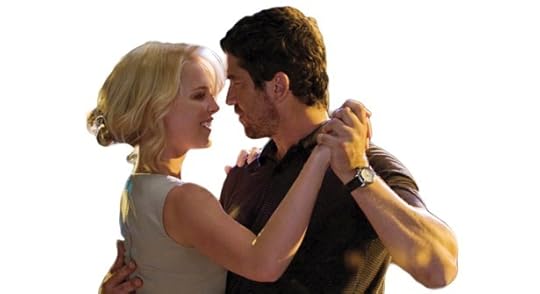
Why Are Romantic Comedies So Bad?
The film follows Brian Gilchrist (Cooper), a defense contractor who returns to Hawaii for a project launching a satellite into space. He reconnects with his ex-girlfriend (Rachel McAdams), who’s now married to a comically un-talkative pilot (John Krasinski), and meets Allison Ng (Emma Stone), a manic-pixie fighter pilot who’s purportedly a quarter-Hawaiian and a quarter-Chinese. The whole story is a tangled mess. Aloha sees itself as a quirky, funny, and sad, but loudly announces when it’s trying to be those things, while its attempts to develop its characters somehow feel strenuously lazy—like a driver who wastes an hour looking for a shortcut.
Ahead of Aloha’s release, Sony faced criticism from the Media Action Network for Asian Americans for not featuring islanders or Asian Americans in speaking roles, despite Hawaii being only 30 percent white. There’s some truth to the group’s complaint that the film uses Hawaii as an “exotic backdrop,” and the entire main cast is indeed white (Alec Baldwin, Bill Murray, and Danny McBride also make appearances). But MANAA neglected to mention that the film features Bumpy Kanahele, a highly respected, indigenous Hawaiian nationalist leader who plays himself. Kanahele speaks on his own turf and in his own words with Gilchrist and Ng about the problems and concerns of native Hawaiians, before inviting them to eat and drink with the rest of the community. It’s a touching, if short-lived, vignette that indisputably stems from genuine reverence and compassion for the people of Hawaii. Besides, when was the last time a major motion picture even glanced at the lives of America’s indigenous people with something other than mockery?
The film, for all its frustrating narrative flaws, gets other little things right, too: showing the islanders taking off their shoes before entering the house and highlighting the fraught relationship between Hawaiians and the U.S. military. (Aloha goes so far as to use the incredibly loaded term “occupation,” giving voice to a controversial, but forcefully held local viewpoint.) It also casts actual Hawaiians to play Native Hawaiian characters, unlike 50 First Dates, which had the noted character actor Rob Schneider play a shirtless, marijuana-loving Hawaiian caricature named Ula.
But it’s true that most of these characters don’t have any lines, which may give the unfortunate impression that Kanahele’s just a local mouthpiece—or a symbol—shoehorned into the storyline. This is a point that will undoubtedly come off to many as an unnecessarily critical to many viewers. But to understand MANAA’s frustration, it’s important to remember that many Americans see Hawaii less as a real place than as a promise on a postcard, already reduced to an abstraction, and its native inhabitants even more so.
Many Americans see Hawaii less as a real place than as a promise on a postcard, reduced to an abstraction.It’s hard, too, to defend Aloha against claims that it overly romanticizes Hawaii. The opening credits run over old-timey footage set to ukelele music—a kind of mood-collage approach that bogs down the rest of the film. (In place of realistic interactions, Aloha often uses swelling music to signal that an emotional connection has taken place.) Many of the characters talk, for no discernible reason, about Hawaiian mythology—the gods Lono and Pele; the menehune, or little people who live in the forests; the huaka'i pō, or warrior ghosts. Ng, Stone’s character, frequently comments on the mana (power or spiritual energy) of a particular area, as if noting the feng shui of a room. It’s within this vaguely magical, supposedly authentic context that Cooper’s character manages to finally open up to others, make amends for his past mistakes, and, of course, get the girl.
Given all this, it’s easier to see Aloha for what it is: a film that prioritizes the white American viewpoint, just like the vast majority of films and TV shows that will come out this year. Which is not in itself an inherently bad thing, and doesn’t erase the film’s laudable progress. But even someone who isn’t offended by stories set in predominantly non-white areas featuring mostly white actors can admit such stories are unrealistic. As a result, unnecessarily “whitewashed” films like Aloha will encounter more and more pushback as time goes on, because those stories will feel increasingly at odds with how Americans see the country they live in.
Of course, attempts to diversify Hollywood will invariably lead to works that inspire cognitive dissonance. Anyone who’s lived in Hawaii will feel an awkward mix of recognition and disillusionment when watching Aloha. As Cooper’s character explains with all the requisite cynicism that he’ll later be cured of: "Nobody wants to live where they are, they want to live in a fantasy.” In this film, if not in life, viewers aren’t forced to choose between myth and reality.









How Comedians Became Public Intellectuals

This week, in a much-anticipated sketch on her Comedy Central show, Amy Schumer staged a trial of Bill Cosby in “the court of public opinion.” Schumer—her character, at any rate—played the role of the defense. “Let’s remind ourselves what’s at stake here,” she argued to the jury. “If convicted, the next time you put on a rerun of The Cosby Show you may wince a little. Might feel a little pang. And none of us deserve that. We don’t deserve to feel that pang.”
Her conclusion? “We deserve to dance like no one’s watching, and watch like no one’s raping.”
Related Story
The Ascendancy of the 'Awkward Older Sister'
Ooof. This is the kind of thing that gets Inside Amy Schumer referred to as “the most feminist show on television,” and her act in general called, in a phrase that reveals as much about her craft as about Schumer herself, “comedy with a message.” But while Schumer’s work is operating at the vanguard of popular comedy, it’s also in line with the work being done by her fellow performers: jokes that tend to treat humor not just as an end in itself, but as a vehicle for making a point. Watch like no one’s raping.
The stuff of late-night LOLs used to be quippy monologues, vapid celebrity interviews, Stupid Human Tricks both official and less so. It still is, to some extent. More often, though, TV comedy that self-consciously defines itself as “comedy”—the stuff that originally airs on Comedy Central and FXX and HBO, the stuff that is firmly rooted in traditions of sketch and standup—is taking on subjects like racism and sexism and inequality and issues including police brutality and trigger warnings and intersectional feminism and helicopter parenting and the end of men. Its jokes double as arguments. “Comedy with a message” may be vaguely ironic; it is also, increasingly, redundant.
So when Schumer, in a set that aired on her show, comments with purposeful nonchalance that “we’ve all been a little bit raped,” she may be making viewers laugh. But she is, much more importantly, making us squirm. She’s daring us to consider the definition of “rape,” and also the definition of another word that can be awkward in comedy and democracy alike: “we.” She’s making a point about inclusion and exclusion, about the individuality of experience, about the often flawed way we think about ourselves as a collective. This is comedy at only the most superficial level; what it is, really, is cultural criticism.
Comedians are acting not just as joke-tellers, but as truth-tellers—as guides through our cultural debates.So is the work of Key and Peele, who make productive fun of racial politics. And of Abbi Jacobson and Ilana Glazer, who make fun of a culture that’s obsessed, at varying levels of ingenuousness, with authenticity. And of Sarah Silverman, who makes fun of religion. And of Patton Oswalt, who makes fun of civilization. And of Louis C.K., who makes fun of himself. And of Nick Kroll, who explored the deep cultural influences of reality TV. And of Stephen Colbert, who satirized the equally deep influences of partisan news networks. And of Jon Stewart and John Oliver and Larry Wilmore, who take the Roonian rant to its apotheosis, blurring whatever line there might be between “comedy” and “commentary.”
Which, on the one hand, puts the current crop of culturally influential comedians in league with pretty much any human who has ever, in the face of an awkward silence, decided to make a fart joke. The point of comedy has always been, on some level, a kind of productive subversion. Observational comedy, situational comedy, slapstick comedy, comedy that both enlightens and offends—these are forms of creative destruction, at their height and in their depths, and they’ve long allowed us to talk about things that taboos, or at the very least taste, might otherwise preclude. Long before Jon Stewart came along, there was Richard Pryor and Joan Rivers and George Carlin. There were people who used laughter as a lubricant for cultural conversations—to help us to talk about the things that needed to be talked about.
The difference now, though, is that comedians are doing their work not just in sweaty clubs or network variety shows or cable sitcoms, but also on the Internet. Wherever the jokes start—Comedy Central, The Tonight Show, Marc Maron’s garage—they will end up, eventually and probably immediately, living online. They will, at their best, go “really, insanely viral.” The frenzy to post a John Oliver rant after it airs on HBO has become a cliché at this point; its effect, though, is to create a kind of tentacular influence for an otherwise niche comedy show. Some people may watch Oliver’s stuff live, or DVRed; but most watch it while riding the bus, or waiting for a meeting, or eating a sad desk lunch, delivered via Facebook or Twitter or the Huffington Post. Most people watch Schumer’s stuff that way, too. And Wilmore’s. And Stewart’s. Comedy, like so much else in the culture, now exists largely of, by, and for the Internet.
Comedy, which relies on productive subversion, has long helped us to talk about the things we need to talk about.Which is to say that there are two broad things happening right now—comedy with moral messaging, and comedy with mass attention—and their combined effect is this: Comedians have taken on the role of public intellectuals. They’re exploring and wrestling with important ideas. They’re sharing their conclusions with the rest of us. They’re providing fodder for discussion, not just of the minutiae of everyday experience, but of the biggest questions of the day. Amy Schumer on misogyny, Key and Peele on terrorism, Louis C.K. on parenting, Sarah Silverman on Rand Paul, John Oliver on FIFA … these are bits intended not just to help us escape from the realities of the world, but also, and more so, to help us understand them. Comedians are fashioning themselves not just as joke-tellers, but as truth-tellers—as intellectual and moral guides through the cultural debates of the moment.
And the public, with the help of the media, are happily taking their lead. See the adulation in headlines like “Louis C.K.'s Explanation of Why He Hates Smartphones Is Sad, Brilliant” (which was followed up, predictably, by “Louis C.K. Is Wrong About Smartphones”) and “Tina Fey and Amy Poehler’s Feminist Joke About Amal Clooney’s Achievements Was Hilarious and Spot-On” and “9 Moments from Last Night’s Inside Amy Schumer You Can Use to Battle Everyday Sexism.” See also the indignation in blunt announcements like “Amy Schumer Compares Birth Control to Gun Rights.” See also the outrage over the tweets of Trevor Noah, which took for granted a fairly radical idea: that the new host of The Daily Show will have a kind of moral influence over the national soul.
Our comedic intellectuals, just like their counterparts in the academy, regularly debate among themselves (Oswalt on C.K., C.K. on Tracy Morgan, this week’s much-hyped roundtable of lady comics). But their most important function is to stimulate debates among the rest of us. They are adjuncts—to op-ed pages, to TV news programs, to periodicals and journals and book reviews, to the several institutions that have been self-consciously modeled as guardians of the national discourse. And we, for our part—“we,” the cultural and constitutional collective that Amy Schumer provokes us to define—allow them to be. As Mike Sacks, an editor at Vanity Fair and the author, most recently, of Poking a Dead Frog: Conversations with Today's Top Comedy Writers, told me: There’s a general feeling right now that “comedy can change people's opinions.”
The outrage over Trevor Noah took for granted a radical idea: that the new host of The Daily Show would have influence over the national soul.That feeling has been around for a while. In 2009, Foreign Policy published a list of the world’s top 20 public intellectuals, among them Amartya Sen, Noam Chomsky, and Mario Vargas Llosa. It was telling that, when the magazine gave the public the opportunity to suggest a write-in addition to the official list, readers didn’t select an economist or a novelist or a philosopher for the honor. They selected Stephen Colbert.
Which is, all in all, a very good thing. While it’s hard to know why, precisely, comedy has taken an echelonic place in the culture—though it probably has something to do with the creation of YouTube and the invention of Facebook and the popularity of basic cable and the influence of Jon Stewart and the power of Karl Rove and the genius of Tina Fey and the rise of “p.c. culture” and auteur theory and Pareto distributions and all those dire predications about the end of the age of irony—the basic explanation is the same as the one that will explain most things when it comes to marketplaces of ideas: There was an unmet need. Recent years have been especially interesting, as “interesting times” go; the microcosmic comedy that was popular in the ‘90s—an observational strain that culminated in a show that proudly claimed to be “about nothing”—quickly became unfit for them. Gradually and then suddenly, the smug nihilism of Larry David and Adam Sandler and Carrot Top and that guy who smashed watermelons with comically oversized mallets came to seem not just out of place, but regressive.
Comedy ceased to be the province of angsty and possibly drug-addled white guys making jokes about their needy girlfriends and airplane food. It became (slightly) less exclusionary to women and minorities. It began to ask, and answer, the questions that newfound diversity will tend to bring up—questions about power dynamics and privilege and cultural authority.
As comedy began to do a better job of reflecting the world, it began, as well, to take on the responsibilities associated with that reflection. It began to recognize the fact that the long debate about the things comedy owes to its audiences and itself—the old “hey, I’m just making a joke” line of logic—can be partially resolved in the idea that nothing, ultimately, is “just a joke.” Humor has moral purpose. Humor has intellectual heft. Humor can change the world. We may well deserve, as Schumer said this week, to “watch like no one’s raping.” What she didn’t say, but what is clear from her comedy, is that jokes themselves have a way of getting us what we deserve.









Atlantic Monthly Contributors's Blog
- Atlantic Monthly Contributors's profile
- 1 follower



